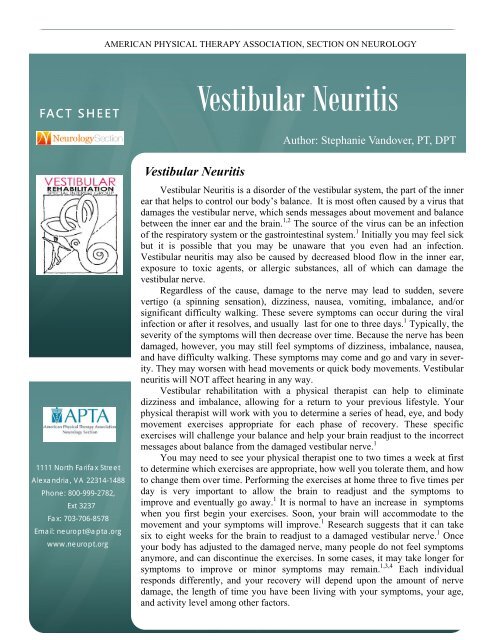Vestibular Neuritis - Neurology Section
Vestibular Neuritis - Neurology Section
Vestibular Neuritis - Neurology Section
Create successful ePaper yourself
Turn your PDF publications into a flip-book with our unique Google optimized e-Paper software.
AMERICAN PHYSICAL THERAPY ASSOCIATION, SECTION ON NEUROLOGYFACT SHEET<strong>Vestibular</strong> <strong>Neuritis</strong>Author: Stephanie Vandover, PT, DPT1111 North Farifax StreetAlexandria, VA 22314-1488Phone: 800-999-2782,Ext 3237Fax: 703-706-8578Email: neuropt@apta.orgwww.neuropt.org<strong>Vestibular</strong> <strong>Neuritis</strong><strong>Vestibular</strong> <strong>Neuritis</strong> is a disorder of the vestibular system, the part of the innerear that helps to control our body’s balance. It is most often caused by a virus thatdamages the vestibular nerve, which sends messages about movement and balancebetween the inner ear and the brain. 1,2 The source of the virus can be an infectionof the respiratory system or the gastrointestinal system. 1 Initially you may feel sickbut it is possible that you may be unaware that you even had an infection.<strong>Vestibular</strong> neuritis may also be caused by decreased blood flow in the inner ear,exposure to toxic agents, or allergic substances, all of which can damage thevestibular nerve.Regardless of the cause, damage to the nerve may lead to sudden, severevertigo (a spinning sensation), dizziness, nausea, vomiting, imbalance, and/orsignificant difficulty walking. These severe symptoms can occur during the viralinfection or after it resolves, and usually last for one to three days. 1 Typically, theseverity of the symptoms will then decrease over time. Because the nerve has beendamaged, however, you may still feel symptoms of dizziness, imbalance, nausea,and have difficulty walking. These symptoms may come and go and vary in severity.They may worsen with head movements or quick body movements. <strong>Vestibular</strong>neuritis will NOT affect hearing in any way.<strong>Vestibular</strong> rehabilitation with a physical therapist can help to eliminatedizziness and imbalance, allowing for a return to your previous lifestyle. Yourphysical therapist will work with you to determine a series of head, eye, and bodymovement exercises appropriate for each phase of recovery. These specificexercises will challenge your balance and help your brain readjust to the incorrectmessages about balance from the damaged vestibular nerve. 1You may need to see your physical therapist one to two times a week at firstto determine which exercises are appropriate, how well you tolerate them, and howto change them over time. Performing the exercises at home three to five times perday is very important to allow the brain to readjust and the symptoms toimprove and eventually go away. 1 It is normal to have an increase in symptomswhen you first begin your exercises. Soon, your brain will accommodate to themovement and your symptoms will improve. 1 Research suggests that it can takesix to eight weeks for the brain to readjust to a damaged vestibular nerve. 1 Onceyour body has adjusted to the damaged nerve, many people do not feel symptomsanymore, and can discontinue the exercises. In some cases, it may take longer forsymptoms to improve or minor symptoms may remain. 1,3,4 Each individualresponds differently, and your recovery will depend upon the amount of nervedamage, the length of time you have been living with your symptoms, your age,and activity level among other factors.
AMERICAN PHYSICAL THERAPY ASSOCIATION, SECTION ON NEUROLOGY<strong>Vestibular</strong> <strong>Neuritis</strong>You can find additional resources at:The <strong>Vestibular</strong> Disorders Association (www.vestibular.org)Dr. Timothy C. Hain, Northwestern University Medical School (www.tchain.comand www.dizziness-and-balance.com)The National Dizzy and Balance Center (www.stopdizziness.com)References:Herdman SJ. <strong>Vestibular</strong> Rehabilitation, Third Edition. Philadelphia: F.A. Davis Company;2007.Schuknecht HF, Kitamura K: <strong>Vestibular</strong> <strong>Neuritis</strong>. Ann Otol Rhinol Laryngol 1981;90(Suppl79):1.Herdman SJ, Schubert MC, Das VE, Tusa RJ: Recovery of dynamic visual acuity in unilateralvestibular hypofunction. Arch Otolaryngol Head Neck Surg 2003;129:819.Hall CD, Schubert MC, Herdman SJ: Prediction of fall risk reduction in individuals with unilateralvestibular hypofunction. Otol Neurotol Sept 2004;25:746.1111 North Farifax StreetAlexandria, VA 22314-1488Phone: 800-999-2782,Ext 3237Fax: 703-706-8578Email: neuropt@apta.orgwww.neuropt.org
















